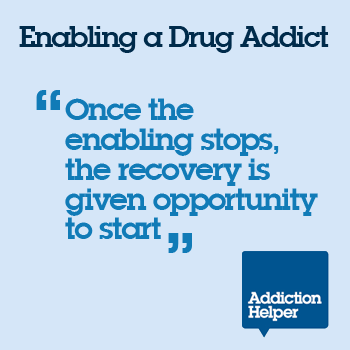Watch Out for the Enablers
Enablers are people who enable or help others to engage in dysfunctional or destructive behavior. Enablers make bad behavior easier and more comfortable to engage in.
‘Enabling’ is a term often used in the context of a relationship with an addict. It might be a drug addict or alcoholic, a gambler, or a compulsive over-eater or even a bi-polar or schizophrenic individual. Enablers, rather than addicts, suffer the effects of the addict’s behavior. Enabling is removing the natural consequences to the addict of his or her behavior.” Psychcentral.com post by Darlene Lancer
Recently someone made it clear to me that she was being an enabler. She essentially protected a person from incarceration with no consequences to their actions.
This prompted me to research enabling from a mental health perspective. I learned that the majority of addicts have at least one enabler in their life. Enablers shield a person from the consequences of their behavior protecting them from the natural consequences.
Antonym of Enabler
In a word the antonym of enabler is a disciplinarian. To prepare those we lead by making artificial consequences which results in changes of behavior.
Good parenting, does the opposite of enabling, a loving parent creates artificial consequences to a child’s bad behavior. Particularly to those actions which are likely to bring future negative consequences in adulthood. Healthy parents provide consequences to prepare children to function in society on their own. This is otherwise known as discipline; of course punishment can be taken too far and can become abusive. But a loving parent provides discipline to a child, it would be unkind for them not to.
Enabling and Organizational Culture?
I find the difference between the behavior of start-up business employees and employees in large corporations fascinating.
- When an employee is heavily promoted despite behavior that would cause loss of business in an open market. They might be experiencing enabling.
- When a lazy or unproductive employee is not made to show up and work hard every day. They might be experiencing enabling.
- When unions save the job of negligent or toxic employees in knee-jerk reactions against management, they might be enablers.
Hard work beats talent when talent doesn’t work hard. – Vala Afshar (@ValaAfshar)
Talent is a skill and is recruited in technology corporations typically based on education. But, hard work is a behavioral issue and is subject to personal will-power. Enablers notoriously overlook bad behavior and even can promote it. Teams of highly talented and educated employees can become very ineffective through a culture that enables bad behavior. This type of corporate culture is often created over years of enabling. Enabling is a major mechanism which hinders the work of hundreds of talented employees.
When an entrepreneur pivots her strategy and creates products to serve her market the new sales themselves is the discipline. Unless the government is meddling, there is no enabler present in the market to shield her. She must pivot her strategy… or not eat.
Organizations do no favor to employees or their customers when they enable bad behavior internally. Enabling cripples people emotionally, over the long term it destroys self-esteem and enslaves people emotionally.
The Free Market Typically Has No (or less) Enablers
It has been said that pursuing entrepreneurship is the best personal development activity available. In creating a profitable business there is rarely artificial shields for the entrepreneur. The free market does not care who you are, (or who you’re not). The free market does not pay your bills because you are accustomed to getting handouts. Serving the free-market well requires hustle, it requires good ideas and it requires self-discipline. It is a survival of the fittest environment and it more closely mirrors reality.
Mental health and addiction professionals warn against enabling. Evidence has shown that an addict experiencing the damaging life-consequences of his addiction provides the most incentive to change. Often this is when the addict “hits bottom” – a term commonly referred to in Alcoholics Anonymous.
How to Help Enablers
Wise leaders give their people incentive to change and do not enable based on the arbitrary, it is bad for business and it is bad for people.
It seems to stop enabling a leader must start with the following:
- Accept the fact that we may be enabling bad behavior; the most difficult part of changing.
- Think what is best for the culture I am leading and pursue that for those we lead.
- Display courage to correct people when they need it (or at least don’t promote bad actors). Great people developers are willing to correct, willing to call a person out when they need to change their behavior.


